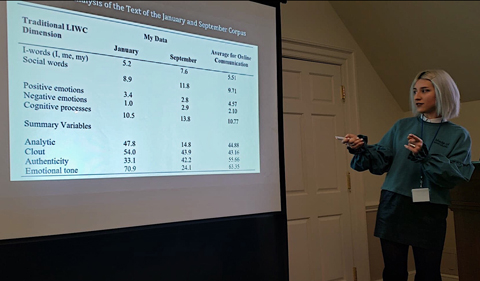By Tanya Tytko ’20MA Linguistics
Spring 2020 semester was supposed to be the highlight of my master’s program. I was planning to present several research projects on which I was collaboratively working in the Linguistics Department at Ohio University and my individual research.
In late February, when we all started to hear disturbing news from China about the novel coronavirus and its first cases began to appear in the United States, I went to my first and final conference at the University of Illinois in Urbana-Champaign.
Presenting at the 12th Annual Illinois Language and Linguistics Society Conference at Illinois was a very rewarding experience. Despite the threat of getting exposed to the virus or spreading it, the conference hosted around a hundred participants and had the Sociolinguistics Symposium within it. A special recognition goes out to the organizers, who were grad students from UIUC. All participants received certificates of presentation, got the chance to network during coffee breaks, and most importantly received valuable feedback after presenting. This feedback helped me to refine subsequent iterations of my paper and its future conference presentations.
While I was returning from ILLS12, I started receiving emails with conference cancellations. To say I was upset is an understatement. I believe that all my peers and grad students, as well as the whole world, started to feel frustrated and somewhat terrified when the breaking news of so many new cases started to accelerate, and the situation with COVID-19 rapidly escalated. I felt impotent and disappointed that all my plans were ruined. So how surprised was I when 2020 OU Student Expo decided to go virtual?
I express my heartfelt gratitude to everyone who made OU Virtual Expo happen. This conference enabled numerous Ohio University students to share their research on social media platforms such as Facebook, Twitter, and Instagram. Thus, out of six conferences that I had planned to attend, the 2020 OU Student Expo, which is an annual celebration of Bobcats’ research efforts, creativity, and excellence, was the first exposition that was held virtually. In limited time, they were able to create new guidelines, find sponsors, and elicit suggestions in the pre-conference survey.
For me, presenting the research which I had conducted for my sociolinguistics project had personal importance and value. During my master’s program, like most other grad students, I faced many struggles; some of them seemed to be unbearable. However, I always had people from my cohort and professors from the Linguistics Department who would support and provide words of encouragement. Sadly, other students, who weren’t as lucky as I was, felt helpless. I was deeply shocked by the statistics on suicide cases among youth in the U.S. For this reason, I decided to approach analyzing suicide markers in a grad student’s communication from a linguistics perspective (e.g., corpus linguistics, text and discourse analysis). The significance of this study was recognized by the audience as well as the judges who awarded me 1st place at the 2020 #OUVirtualExpo.
I personally want to say thank you to everyone in Alden Library who decided to support this convention and provided researchers with essential resources, technological support, and monetary awards. Additionally, I was able to utilize the feedback I got from the UIUC conference and try new modes of presenting in a different format through social media with a large outreach. This provided an opportunity for many other people to learn about my research as well as its findings and share my post on their pages.
Finally, in July, I presented my SLA research at the 2020 TESOL Convention Master’s Forum, which was also held online. All presenters were grouped according to their research topics, and after receiving their time slot, met via Zoom to present to the audience, moderator, and experts, who often engaged in a lively discussion. This was a great chance to meet with my fellow linguistics students, teaching professionals, and researchers. Presenting at the master’s forum with an actual audience resembled real conference experience. Perfect organization and schedule, zero conference participation fee, networking sessions, and ability to attend so many other presentations safely from your own home made this conference a perfect example of resolving the pandemic issue on the conference level. But the happiest moment for me was when, for the first time, my family was able to attend my presentation. Their recognition was the best feedback I’ve received.
All in all, the Ohio University and TESOL conferences showed how it is possible to adjust to the new reality, and with the help of technology exceed prior expectations. I would strongly encourage other students to watch for calls for proposals and apply to present within the U.S. and abroad. It has never been easier to present at conferences and symposiums in Europe, Asia, or Australia than it is now. In fact, online conferences have their own benefits such as lower conference fees and broad international audiences, but most importantly they promote mutual exchange of ideas without the threat of spreading the virus.
Tetiana Tytko ’20, Ph.D. student and Graduate Assistant in the Linguistics Department at the University of Maryland in Hyattsville, Md.






















Comments